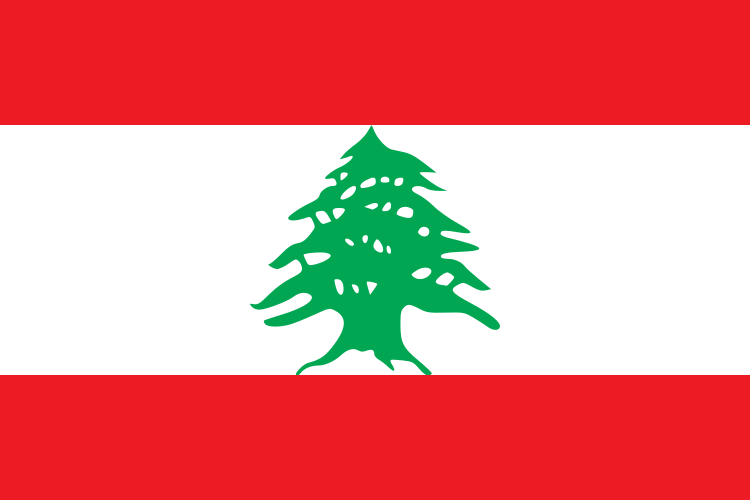
Geography and Climate
Lebanon is a small and beautiful country on the Eastern shore of the Mediterranean Sea. It is located at the meeting point of three continents and, as such, has been the crossroads of many civilizations whose traces may still be seen today. Its coastline is about 225 km (150 miles) in length and is, on average, 45 km (30 miles) wide. The total area of the country amounts to 10,452 square km (4,500 square miles). Along the coast are the five famous cities of Beirut, Byblos, Sidon, Tripoli, and Tyre (see interactive map under Tourism). It is bordered in the north and east by Syria and, in the south, by Palestine.
 Lebanon's beauty is illuminated by its geography (see interactive map under Tourism.) -- its narrow coastal plane and two parallel north/south mountains (the mountains of Lebanon and anti-Lebanon). The fertile Bekaa valley, with its Litani and Orontes Rivers, separates these mountains and nourishes the terrain. Residing majestically over the valley, Qournet Assaouda in the north of Mount Lebanon (altitude 3,083 meters or 10,112 feet) and Jabal al-Sheikh in the south of the anti-Lebanon range (altitude 2,814 meters or 9,230 feet) remain the highest peaks in the country.
Lebanon's beauty is illuminated by its geography (see interactive map under Tourism.) -- its narrow coastal plane and two parallel north/south mountains (the mountains of Lebanon and anti-Lebanon). The fertile Bekaa valley, with its Litani and Orontes Rivers, separates these mountains and nourishes the terrain. Residing majestically over the valley, Qournet Assaouda in the north of Mount Lebanon (altitude 3,083 meters or 10,112 feet) and Jabal al-Sheikh in the south of the anti-Lebanon range (altitude 2,814 meters or 9,230 feet) remain the highest peaks in the country.
This unparalleled natural splendor is enhanced by Lebanon's moderate, Mediterranean climate. Lebanon enjoys about 300 days per year of sunshine. The winter is mild on the coast and snowy in the mountains, while the summer is hot on the coast and mild on the mountains. It is possible during the spring months to ski in the mountains and swim on the coast in the same day!
Government and Politics
Due to its long history, natural beauty, and rich culture, the Republic of Lebanon has always occupied a special place in the world. Beginning with its independence on November 22, 1943, Lebanon has been and continues to be an integral player in the Middle East and throughout the international community. As an Arab country, Lebanon's official language is Arabic; however, English and French are widely spoken. Tolerance and the encouragement of diversity, as well as its strong political culture have confirmed Lebanon's world prominence. Lebanon is a founding member of the League of Arab States (LAS) and the United Nations, and it has played a major role in the drafting of the Universal Declaration of Human Rights.
Upon its independence, Lebanon adopted this flag, with the cedar as a symbol of its enduring strength.
As a democratic republic, Lebanon enjoys a parliamentary system of government with a President, a Prime Minister, and a cabinet chosen through an electoral process. The structure of the government is based on the constitutional principle of separation between the executive, the legislative, and the judicial branches.
History
Lebanon has a heritage almost as old as the earliest evidence of mankind. Its geographic position as a crossroads linking the Mediterranean Basin with the great Asian hinterland has conferred on it a cosmopolitan character and a multicultural legacy. Lebanon has an Arab culture colored by Western influences.
At different periods of its history, Lebanon has come under the domination of foreign rulers, including Assyrians, Babylonians, Persians, Greeks, Romans, and Ottomans. Although often conquered, the Lebanese take pride in their rebellions against despotic and repressive rulers. Moreover, despite foreign domination, Lebanon's mountainous terrain has provided it with a certain protective isolation, enabling it to survive with an identity all its own.










